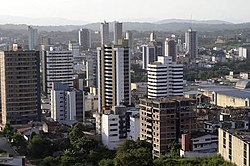Itabuna
| Município de Itabuna Capital do Cacau
Itabuna
|
|||
|---|---|---|---|
|
Aerial view of Itabuna
|
|||
|
|
|||
| Coordinates | 14 ° 47 ′ S , 39 ° 17 ′ W | ||
 Location of the municipality in the state Location of the municipality in the state
|
|||
| Symbols | |||
|
|||
| founding | July 28, 1910, city charter (110 years) | ||
| Basic data | |||
| Country | Brazil | ||
| State | Bahia | ||
| ISO 3166-2 | BR-BA | ||
| height | 54 m | ||
| Waters | Rio Cachoeira | ||
| surface | 401 km² | ||
| Residents | 204,667 (2010) | ||
| density | 510.4 Ew. / km² | ||
| estimate | 213,223 (July 1, 2019) | ||
| Parish code | IBGE : 2914802 | ||
| Time zone | UTC −3 | ||
| Website | itabuna.ba (Brazilian Portuguese) | ||
| politics | |||
| City Prefect | Fernando Gomes Oliveira (2017-2020) | ||
| Political party | DEM | ||
| Culture | |||
| Patron saint | São José | ||
| economy | |||
| GDP | 3,984,074 thousand. R $ 18,024 R $ per capita (2017) |
||
| HDI | 0.712 (high) (2010) | ||
Itabuna , officially Portuguese Município de Itabuna , is a city in the southeast of the Brazilian state of Bahia . It had 204,667 inhabitants at the 2010 census, the population was estimated at 213,223 inhabitants as of July 1, 2019, who live in a community area of around 401 km². The community is 450 kilometers south of Salvador . Itabuna is a relatively young city and was only founded in 1910 from a settlement founded around 1849. It is located inland at a short distance from the port city of Ilhéus .
In contrast to the capital of the state, Salvador da Bahia , which is an internationally recognized economic center, Itabuna is located in a rural region that lives primarily from agriculture. Industrial plants are rather poorly developed here. The cocoa - and cotton production , however, is a stable and reliable source of income due to the processing industries in Salvador. The service sector, on the other hand, has experienced continuous growth over the past few decades.
In Itabuna and on the entire so-called cocoa coast, there are increasing references to African influences. Starting with the food to the language, which has incorporated and integrated many African words. It is due to the fact that the port of Ilhéus was a popular transshipment point for slaves and that many Africans stayed after the end of slavery.
Itabuna is known for the Jequitiba Plaza Center, a shopping center in the center of the city, a meeting place for young people.
Itabuna is the seat of the Itabuna diocese .
history
The Itabuna settlement began to expand in the last century because drovers used the area as a gathering point on their way to Vitória da Conquista . The region is divided by the waterfall of the river Cachoeira (German: 'waterfall').
A steady settlement took place only from 1867, mainly by migrants from the state of Sergipe , among them Sevirino Félix de Oliveira, who later became known as Félix Sevirino do Amor Divino, and by his cousin José Firmino Alves, to whom the founding of the city of Itabuna is ascribed. Felix Sevirino founded the Marimbeta farm at the entrance to the city and today there is still a street with this name in the Conceição district.
In the following 30 years, growth has advanced so strongly that the residents declared their independence as a city, which was rejected by the state government in the state of Bahia. Another successful attempt was made in 1906 after a certain area was mortgaged for the construction of the administrative headquarters.
Sons of the city
- Jorge Amado (1912-2001), writer
- Léo Briglia (1928–2016), football player
- Mateus dos Santos Castro (* 1994), football player
- Washington Cruz (* 1946), Bishop of São Luís de Montes Belos, Archbishop of Goiânia
- Henrique Loureiro dos Santos (* 1986), football player
- Jackson Caucaia (born 1987), football player
- Alef Vieira Santos (* 1993), football player
literature
- Ayalla Oliveira Silva: As origens de Itabuna: o mito ea história. In: Mosaico , Rio de Janeiro, Volume 2, 2011, No. 4. ( Online in the web archive , Brazilian Portuguese).
- Prefeitura Municipal de Itabuna, Secretaria da Fazenda e Planejamento: Anuário Estatístico de Itabuna. Base de dados 2018. PMI / UESC, Itabuna, BA [2019] (Brazilian Portuguese; PDF; 17.2 MB).
Web links
- City Prefecture website , Prefeitura Municipal (Brazilian Portuguese)
- City Council website , Câmara Municipal (Brazilian Portuguese)
- IBGE : Itabuna - Panorama. In: cidades.ibge.gov.br. (Brazilian Portuguese). Updated statistics.
Individual evidence
- ↑ a b c IBGE : Itabuna - Panorama. In: cidades.ibge.gov.br. Retrieved May 26, 2020 (Brazilian Portuguese).
- ↑ Itabuna City Council website - History ( Memento of March 2, 2014 in the Internet Archive ), accessed on November 11, 2018 (Brazilian Portuguese).




